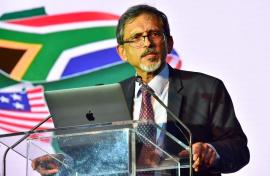
Trade, Industry and Competition Minister, Ebrahim Patel, has thrown his weight behind the reauthorisation of the African Growth and Opportunity Act (AGOA) as swiftly as possible and with refinements that do not require lengthy discussions.
Patel was delivering closing remarks at the three-day 20th African Growth and Opportunity Act Forum held at Nasrec in Johannesburg.
“One idea that's come up from the discussions is whether we should consider, if needed, a two-stage programme. But the first stage firmly focused on reauthorisation as rapidly as possible, maybe with a modest package of refinements that does not require lengthy discussions.
“The second stage with further and perhaps deeper improvements that require more time and further study, and that can be done fairly shortly thereafter. We are particularly keen to get the reauthorisation in the earliest part of 2024, so this will be very helpful.
“These are ideas that we want our friends in the United States to think through and consider. We are also reflecting a little bit on these weighing up the pros and cons,” the Minister said.
The Africa Growth and Opportunity Act is a unilateral trade preference scheme that provides qualifying sub-Saharan African countries with duty-free, quota-free access into the United States market. AGOA remains the cornerstone of the USA’s commercial relations with sub-Saharan Africa.
The Minister said that discussions at the forum also looked at a graduation system once countries reach a particular level of advancement, adding that they can be even considered a "constructive conversation about the matrix of that level of advancement".
Patel also emphasised that there are policy areas that need to be relooked, adding that polishing existing policies would make room for more African products to make it to the international market.
“Those colleagues who’ve been enjoying our fruits, SA citrus fruit from the region, which can be available in larger quantities, we can resolve those things. Matters we constructively engage in, for example relating to steel and aluminium, these are practical solutions we believe can unlock the value of trade. In different parts of the continent, in West Africa, there are constraints in accessing the American market. In East Africa, there are different products we need to refine.”
Patel highlighted that the discussions also looked at the idea of small businesses to small business partnership between the African continent and the United States.
“We looked at the product scope. Is there appetite to increase the number of products covered by AGOA? By way of illustration, we shared with Congressional representatives, an example of 10 products where Africa has capacity, and where Africa has fantastic products, some of which you've tasted in the last few days,” he told delegates.
“We recognise we need to balance the level of our ambition on extending the product list against the concerns about the time that may be required to reach consensus in Congress on these factors. While we would obviously prefer as much as possible, we want to avoid such a broad review that we delay reauthorisation,” he said.
Mineral beneficiation
Mineral beneficiation on the African continent was also under the spotlight.
“We said we don't want to be the exporter of rocks. We want to be the exporter of consumer and capital goods… and the producers of electric vehicles. And it raises the question of a moment of a grand bargain between Africa and its friends elsewhere in the world, where there's a partnership around critical minerals, but also with processing of critical minerals on the African continent,” he said.
The Minister believes that the African Continental Free Trade Area (AfCFTA) is a game changer.
He explained that AGOA on its own gave the continent significant access on a range of products to the world's single biggest national consumer market.
“What the AFCFTA will add to that is that the combined weight of access to African markets and access to the US market will give us the scale to draw investment, and scale is what investors look at. They want to be able to see that the size of the market justifies the investment.
“We also said that AFCFTA is helping to foster value chains. It is a critical driver to help industrialise and so more and more countries will now begin to have these value chains, so those value chains will then enable better utilisation of AGOA,” he said.
Impact
The United States of America Trade Representative, Katherine Tai, also addressed the closing ceremony and emphasised that AGOA remains the cornerstone of the U.S. economic partnership with Africa.
“Let us not forget the real impact AGOA has had on real lives, real people: the woman entrepreneur seeking to expand her macadamia nut processing business; the small business owner making apparel and handicrafts, and the countless students and youth, waiting to make their mark on this ever-changing continent,” she said.
President Cyril Ramaphosa addressed the opening of the forum on Friday. In his address, the President said an extension of AGOA for a longer period of time could act as an instrument to entice investors to pour more resources into the African continent.
“We would like you to look at the extension or renewal of AGOA for a sufficiently lengthy period for it to act as an incentive for investors to build new factories on the African continent,” said the President.
The purpose of the forum is to discuss ways to expand trade and investment relations between the United States and sub-Saharan Africa, and the implementation of AGOA, including encouraging joint ventures between small and large businesses. - SAnews.gov.za


